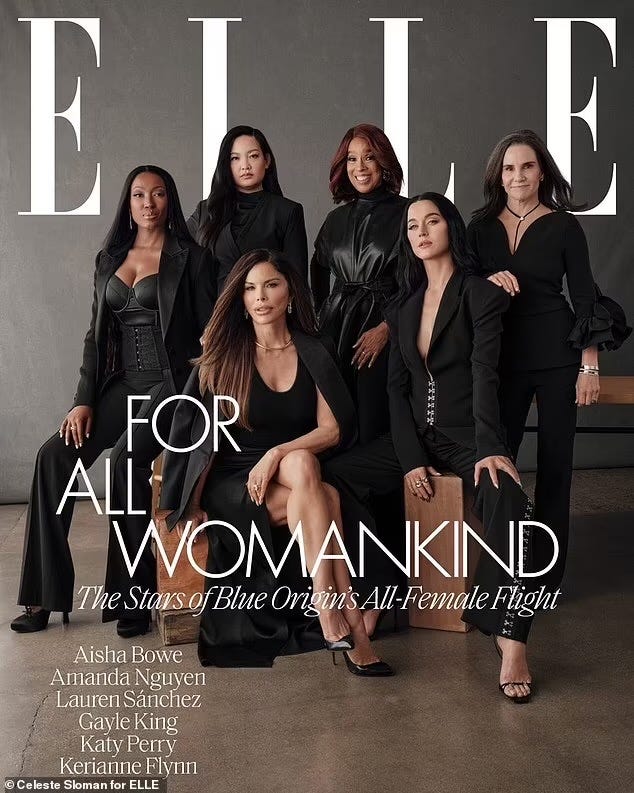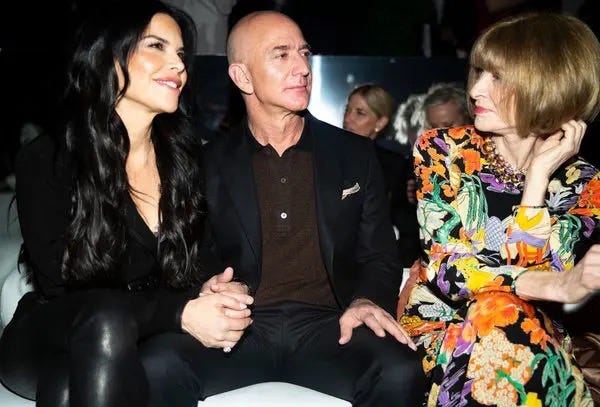Lauren Sánchez’s ascent into the stratosphere, both literal and metaphorical, offers a kaleidoscopic view into the cultural machinery of late capitalism, where personal reinvention and relational capital converge to produce a new archetype: the billionaire wife as cultural icon. Her forthcoming journey to space on April 14th, splashed across the glossy pages of Elle Magazine with a demeanor that radiates calculated triumph, is less a narrative of individual barrier-breaking and more a meticulously staged performance of power adjacency. This is not the story of a woman boldly venturing into the cosmos; it is the tale of a figure who has harnessed the gravitational pull of Jeff Bezos’s wealth and influence to orbit a new echelon of social legitimacy. Far from a feminist odyssey or a altruistic quest to save the planet, Sánchez’s trajectory reveals a deeper cultural script, one where the role of the billionaire wife is not merely a passive accessory but an active architect of a branded empire, reshaping the contours of prestige in a world enthralled by spectacle.
Act I: From Scandal to Sanctification
The cultural memory of 2019 lingers like a tabloid ghost: the National Enquirer’s lurid exposé of Bezos and Sánchez’s affair, complete with leaked messages that oscillated between the banal and the baroque. In the harsh glare of paparazzi lenses, Sánchez could have been relegated to the margins, a fleeting footnote in the annals of billionaire indiscretions. Yet, in a society that thrives on redemption arcs, she refused the script of shame. Instead, she orchestrated a metamorphosis that turned scandal into a springboard, leveraging the chaos to catapult herself from tabloid caricature to Vice Chair of the Bezos Earth Fund. This was no organic evolution but a deliberate cultural maneuver, a rebranding so seamless it could double as a case study in the commodification of identity. The climate crisis, a cause du jour for the ultra-wealthy, became her stage, her association with Bezos’s billions reframing her as a steward of global good. The transition from “mistress” to “mission-driven philanthropist” reflects not just personal ambition but a broader cultural appetite for narratives that sanitize excess through the veneer of purpose.
Act II: Media as Mirror and Maker
Sánchez’s mastery of the media ecosystem underscores a defining trait of contemporary culture: the collapse of authenticity into artifice. Her Elle cover, timed impeccably with an all-female space mission, is less a journalistic coup than a choreographed act of mythmaking. The framing—Sánchez as a trailblazer in a male-dominated frontier—taps into a collective yearning for feminist victories, yet the reality is more prosaic: she is a passenger, not a pioneer. This dissonance reveals the media’s role not as a reflector of truth but as a co-conspirator in the construction of aspirational personas. Space, that ultimate symbol of human ambition, becomes a prop in Sánchez’s personal brand, a backdrop against which she casts herself as a protagonist in a story of empowerment. The cultural significance lies not in her contribution to exploration but in her ability to alchemize proximity to power into a simulacrum of agency, a testament to a society where visibility often trumps substance.
Act III: The Wedding as Cultural Text
The impending nuptials of Sánchez and Bezos in Venice transcend the private act of union to become a public ritual of consecration. This is no mere wedding; it is a pageant of excess, a floating tableau of yachts and private water taxis ferrying a guest list that doubles as a directory of global elites. In a culture that fetishizes wealth as performance, the event promises to crystallize the Bezos-Sánchez alliance as a new node in the constellation of power. Venice, with its sinking grandeur, serves as an apt metaphor for a society drowning in its own opulence, yet the wedding’s scale—its unabashed extravagance positions it as a cultural artifact, a moment where love is less the point than the projection of dominance. This is the apotheosis of the billionaire wife industrial complex: a union that merges personal narrative with corporate strategy, rewriting the wedding as a branding exercise that reverberates across media and memory.
Act IV: Anna Wintour and the Anointing of Status
Enter Anna Wintour, the high priestess of cultural capital, whose involvement in Sánchez’s wedding attire elevates the affair into the realm of sanctioned spectacle. Wintour’s imprimatur, bestowed through the lens of Vogue’s rarified gaze, signals more than a fashion choice; it is a ritual of inclusion into the pantheon of the elite. Historically, Wintour has crowned women who forged their own paths, yet Sánchez’s ascent is tethered to Bezos’s orbit. This tension illuminates a cultural shift: success is no longer solely the province of self-made titans but increasingly a byproduct of strategic alignment. Wintour’s endorsement reframes Sánchez not as a mere appendage but as a figure of luxury and legitimacy, a move that mirrors society’s evolving definition of achievement—one where relational networks supplant individual merit as the currency of influence.
Act V: The Cost of the Crown
Lauren Sánchez emerges as a cipher for a new cultural paradigm, where the billionaire wife is not a passive trophy but a co-creator of a dynastic narrative. Her story, spanning scandal, space, and a wedding that rivals a state affair, charts the erosion of traditional markers of success (innovation, labor, creation) in favor of a hyper-mediated game of positioning. This is a world where power is less about what you build and more about who you bind yourself to, where the spectacle of wealth eclipses the substance of contribution.
Sánchez’s rise, abetted by Bezos’s billions and Wintour’s nod, reflects a society entranced by its own reflections—a hall of mirrors where identity is a performance, and influence is the ultimate prize. Yet, beneath the dazzle lies a question: what does it mean to triumph in a culture that celebrates the branding of proximity over the forging of legacy? In Sánchez, we see not just a woman beside a billionaire but a mirror held up to our collective fascination with power, privilege, and the stories we tell to justify them.











I am amazed the you wrote this and that I actually read it. What a waste of your talent (I do admire both your command of language and insight) and my time. Your insight is great but 3 paragraphs would have been enough, more and it becomes as fake as the 55 year old silicon blown up wanna be.
To me, the big story is that Amazon is a success because McKenzie did all the work of setting it up but she was “replaced” in Bezo’s orbit by the fake bimbo and the news/gossip circus.
And here I am using my time and energy ranting about our fascination with empty glitz.
She is far from the woman he fooled around with. She has morphed into something else and he deserves every miserable moment